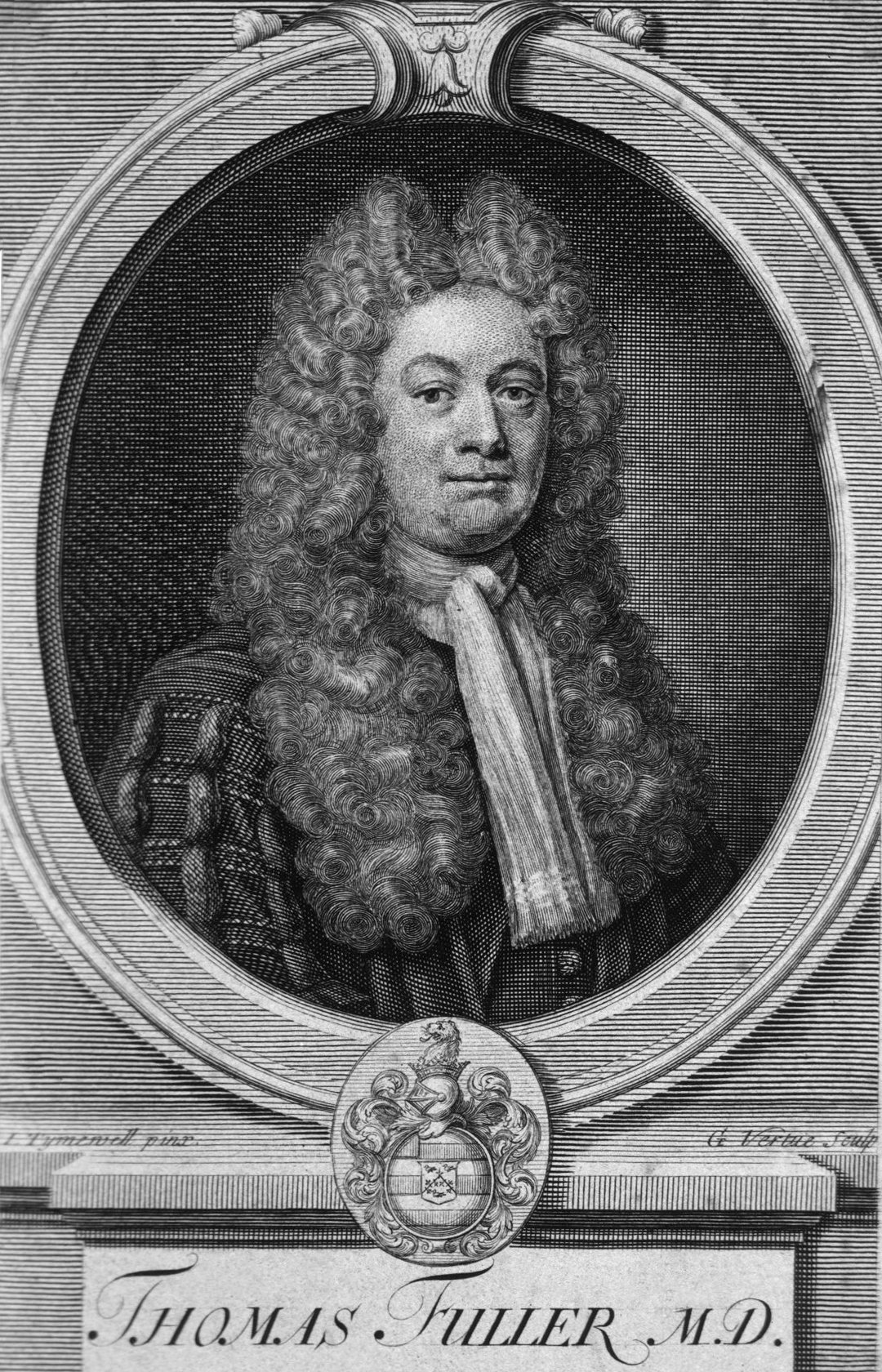“4657. The more Cooks, the worse Broth.”
Introductio ad prudentiam: Part II (1727), Gnomologia (1732)
Thomas Fuller, M.D. was a British physician, preacher and intellectual.
Fuller was born in Rosehill, Sussex, and educated at Queens' College, Cambridge. He practised medicine at Sevenoaks.
In 1723 he published Pharmacopoeia Domestica, and in 1730 Exanthematologia, Or, An Attempt to Give a Rational Account of Eruptive Fevers, Especially of the Measles and Small Pox. In 1732 he published a compilation of proverbs titled Gnomologia: Adagies and Proverbs; wise sentences and witty saying, ancient and modern, foreign and British which includes the words, "Be you never so high, the law is above you".
Wikipedia

“4657. The more Cooks, the worse Broth.”
Introductio ad prudentiam: Part II (1727), Gnomologia (1732)
“5000. This, or any Moment may be your last.”
Introductio ad prudentiam: Part II (1727), Gnomologia (1732)
“6099. Help, Hands;
For I have no Lands.”
Compare Poor Richard's Almanack (1745) : Help, Hands; for I have no Lands.
Introductio ad prudentiam: Part II (1727), Gnomologia (1732)
“3214. Light-heel'd Mothers make leaden-heel'd Daughters.”
Compare Poor Richard's Almanack (1745) : Light heel'd mothers make leaden-heel'd daughters.
Introductio ad prudentiam: Part II (1727), Gnomologia (1732)
“509. All complain of want of Memory, but none of want of Judgment.”
Compare Poor Richard's Almanack (1745) : Many complain of their Memory, few of their Judgment.
Introductio ad prudentiam: Part II (1727), Gnomologia (1732)
“4301. Tailors and Writers must mind the Fashion.”
Introductio ad prudentiam: Part II (1727), Gnomologia (1732)
“1537. Fine Cloth is never out of Fashion.”
Introductio ad prudentiam: Part II (1727), Gnomologia (1732)
“294. A Man may lead his Horse to Water, but cannot make him drink.”
Introductio ad prudentiam: Part II (1727), Gnomologia (1732)
“3655. None knows the Weight of another's Burthen.”
Introductio ad prudentiam: Part II (1727), Gnomologia (1732)
“4693. The older a Fool is, the worse he is.”
Introductio ad prudentiam: Part II (1727), Gnomologia (1732)
“4545. The Fox may grow grey, but never good.”
Compare Poor Richard's Almanack (1749) : Many Foxes grow grey, but few grow good.
Introductio ad prudentiam: Part II (1727), Gnomologia (1732)
“613. An Hour may destroy what an Age was a building.”
Introductio ad prudentiam: Part II (1727), Gnomologia (1732)
“4070. Sauce for a Goose, is Sauce for a Gander.”
Introductio ad prudentiam: Part II (1727), Gnomologia (1732)
“4853. The Wrath of Brothers, is fierce and devilish.”
Introductio ad prudentiam: Part II (1727), Gnomologia (1732)
Introductio ad prudentiam: Part II (1727)
“241. A light Purse makes a heavy Heart.”
Compare Poor Richard's Almanack (1733) : Light purse, heavy heart.
Introductio ad prudentiam: Part II (1727), Gnomologia (1732)
“892. Better eat Salt with Philosophers of Greece, than eat Sugar with Courtezans of Italy.”
Compare Poor Richard's Almanack (1740) : Thou hadst better eat salt with the Philosophers of Greece, than sugar with the Courtiers of Italy.
Introductio ad prudentiam: Part II (1727), Gnomologia (1732)
“4374. That War only is just, which is necessary.”
Introductio ad prudentiam: Part II (1727), Gnomologia (1732)
“977. Beware of no Man more than thy self.”
Introductio ad prudentiam: Part II (1727), Gnomologia (1732)
“2248. He that plants Trees, loves others besides himself.”
Introductio ad prudentiam: Part II (1727), Gnomologia (1732)
Introductio ad prudentiam: Part II (1727)
“3403. Men seek less to be instructed than applauded.”
Introductio ad prudentiam: Part II (1727), Gnomologia (1732)
“6384. He that would please all, and himself too,
Undertakes what none could ever do.”
Introductio ad prudentiam: Part II (1727), Gnomologia (1732)
Introductio ad prudentiam: Part II (1727)